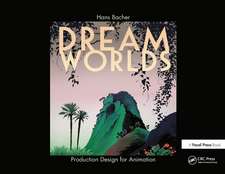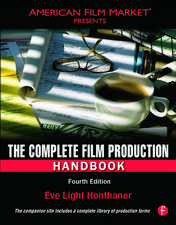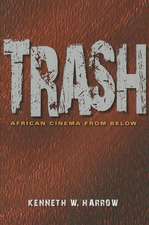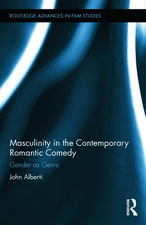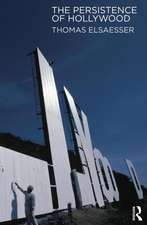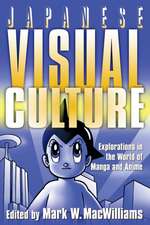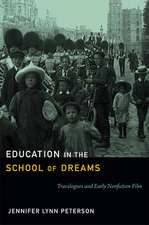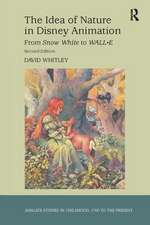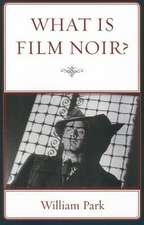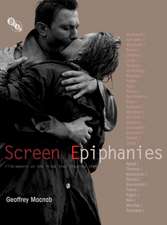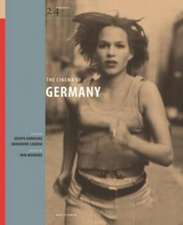Cinema, Memory, Modernity: The Representation of Memory from the Art Film to Transnational Cinema: Routledge Advances in Film Studies
Autor Russell J.A. Kilbournen Limba Engleză Paperback – 16 mar 2012
| Toate formatele și edițiile | Preț | Express |
|---|---|---|
| Paperback (1) | 439.85 lei 6-8 săpt. | |
| Taylor & Francis – 16 mar 2012 | 439.85 lei 6-8 săpt. | |
| Hardback (1) | 1117.43 lei 6-8 săpt. | |
| Taylor & Francis – 17 mai 2010 | 1117.43 lei 6-8 săpt. |
Din seria Routledge Advances in Film Studies
-
 Preț: 319.20 lei
Preț: 319.20 lei -
 Preț: 310.14 lei
Preț: 310.14 lei -
 Preț: 349.02 lei
Preț: 349.02 lei -
 Preț: 301.93 lei
Preț: 301.93 lei -
 Preț: 310.65 lei
Preț: 310.65 lei -
 Preț: 310.85 lei
Preț: 310.85 lei -
 Preț: 313.47 lei
Preț: 313.47 lei -
 Preț: 372.42 lei
Preț: 372.42 lei -
 Preț: 356.77 lei
Preț: 356.77 lei -
 Preț: 349.10 lei
Preț: 349.10 lei - 18%
 Preț: 1106.81 lei
Preț: 1106.81 lei -
 Preț: 416.06 lei
Preț: 416.06 lei - 18%
 Preț: 1116.02 lei
Preț: 1116.02 lei -
 Preț: 449.05 lei
Preț: 449.05 lei -
 Preț: 388.85 lei
Preț: 388.85 lei - 18%
 Preț: 1112.21 lei
Preț: 1112.21 lei - 18%
 Preț: 1112.34 lei
Preț: 1112.34 lei - 18%
 Preț: 1106.81 lei
Preț: 1106.81 lei - 18%
 Preț: 1106.85 lei
Preț: 1106.85 lei -
 Preț: 382.86 lei
Preț: 382.86 lei -
 Preț: 475.65 lei
Preț: 475.65 lei -
 Preț: 441.20 lei
Preț: 441.20 lei -
 Preț: 387.31 lei
Preț: 387.31 lei - 18%
 Preț: 729.62 lei
Preț: 729.62 lei - 18%
 Preț: 1056.95 lei
Preț: 1056.95 lei - 18%
 Preț: 1058.43 lei
Preț: 1058.43 lei - 18%
 Preț: 1161.62 lei
Preț: 1161.62 lei - 30%
 Preț: 848.15 lei
Preț: 848.15 lei - 18%
 Preț: 1109.99 lei
Preț: 1109.99 lei - 18%
 Preț: 1054.43 lei
Preț: 1054.43 lei -
 Preț: 398.48 lei
Preț: 398.48 lei - 18%
 Preț: 1117.43 lei
Preț: 1117.43 lei - 18%
 Preț: 1115.51 lei
Preț: 1115.51 lei - 18%
 Preț: 1114.30 lei
Preț: 1114.30 lei - 18%
 Preț: 1053.16 lei
Preț: 1053.16 lei - 18%
 Preț: 1057.75 lei
Preț: 1057.75 lei - 30%
 Preț: 820.32 lei
Preț: 820.32 lei - 18%
 Preț: 1112.34 lei
Preț: 1112.34 lei - 18%
 Preț: 1057.75 lei
Preț: 1057.75 lei - 18%
 Preț: 1117.43 lei
Preț: 1117.43 lei
Preț: 439.85 lei
Nou
Puncte Express: 660
Preț estimativ în valută:
84.18€ • 87.56$ • 69.49£
84.18€ • 87.56$ • 69.49£
Carte tipărită la comandă
Livrare economică 14-28 aprilie
Preluare comenzi: 021 569.72.76
Specificații
ISBN-13: 9780415520300
ISBN-10: 0415520304
Pagini: 288
Ilustrații: Illustrations
Dimensiuni: 152 x 229 x 15 mm
Greutate: 0.39 kg
Ediția:1
Editura: Taylor & Francis
Colecția Routledge
Seria Routledge Advances in Film Studies
Locul publicării:Oxford, United Kingdom
ISBN-10: 0415520304
Pagini: 288
Ilustrații: Illustrations
Dimensiuni: 152 x 229 x 15 mm
Greutate: 0.39 kg
Ediția:1
Editura: Taylor & Francis
Colecția Routledge
Seria Routledge Advances in Film Studies
Locul publicării:Oxford, United Kingdom
Public țintă
Postgraduate and UndergraduateCuprins
Acknowledgments Introduction: Cinema, Memory, Modernity: The Return of Memory as Film 1: No Escape from Time: Memory and Redemption in the International Postwar Art Film 2: The ‘Crisis’ of Memory: ‘Traumatic Identity’ in the Contemporary Memory Film 3: ‘Global Memory’: Cinema as Lingua Franca and the Commodification of the Image 4: The Eye of History: Memory, Surveillance and Ethicality in the Contemporary Art Film 5: ‘Prosthetic Memory’ and Transnational Cinema: Globalized Identity and Narrative Recursivity in City of God Conclusion: Remembering to Forget: The Catachreses of Modernity Notes Bibliography Index
Notă biografică
Russell J.A. Kilbourn is Assistant Professor of English and Film Studies at Wilfrid Laurier University.
Recenzii
"Cinema, Memory Modernity: The Representation of Memory from the Art Film to Transnational Cinema is a detailed, insightful and, at times, brilliantly perceptive view of this difficult and expansive subject. Kilbourn's choices are certainly representative of memory in post-World War II cinema.[...] Kilbourn's analysis of memory in the cinema, an ongoing theoretical debate often full of incompatibilities and abstractions, is lucidly argued in relation to the ideas of the theorists with whom he either agrees or disagrees. This book provides an engaging read for those who are interested in this aspect of cinema, but will also appeal to scholars of modernity and philosophy at the same time". --Alphaville: Journal of Film and Screen Media
In his book Kilbourn "offers a subtle and fascinating account of the cinematic representation of the problem of memory." --Mark Furstenau, University of Toronto Quarterly
"Cinema, Memory, Modernity alternates between mourning the passing of the 'modern' moment of art cinema and a feisty denunciation of a global post-modern malaise in which subjective meanings have become disguised as collectively globalized through an ever-present visuality." --Adrián Pérez Melgosa, SUNY Stony Brook
In his book Kilbourn "offers a subtle and fascinating account of the cinematic representation of the problem of memory." --Mark Furstenau, University of Toronto Quarterly
"Cinema, Memory, Modernity alternates between mourning the passing of the 'modern' moment of art cinema and a feisty denunciation of a global post-modern malaise in which subjective meanings have become disguised as collectively globalized through an ever-present visuality." --Adrián Pérez Melgosa, SUNY Stony Brook
Descriere
Since its inception, cinema has evolved into not merely a ‘reflection’ but an indispensable index of human experience – especially our experience of time’s passage, of the present moment, and, most importantly perhaps, of the past, in both collective and individual terms. In this volume, Kilbourn provides a comparative theorization of the representation of memory in both mainstream Hollywood and international art cinema within an increasingly transnational context of production and reception. Focusing on European, North and South American, and Asian films, Kilbourn reads cinema as providing the viewer with not only the content and form of memory, but also with its own directions for use: the required codes and conventions for understanding and implementing this crucial prosthetic technology — an art of memory for the twentieth-century and beyond.

